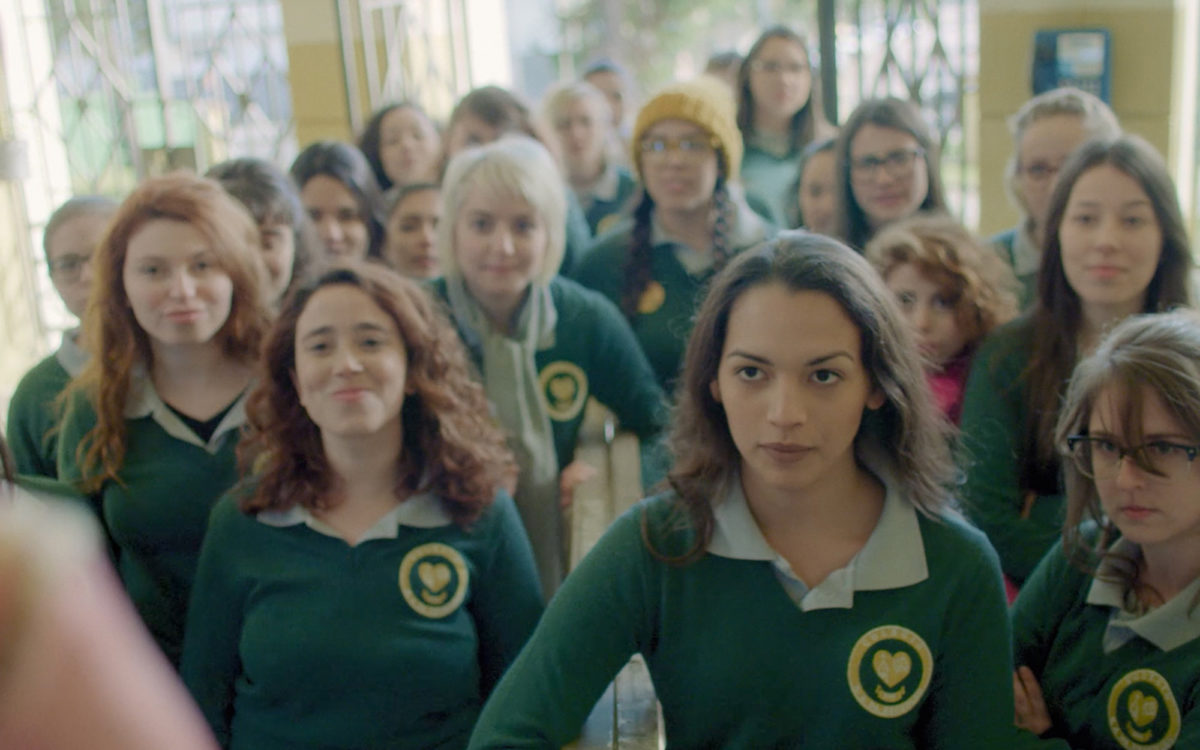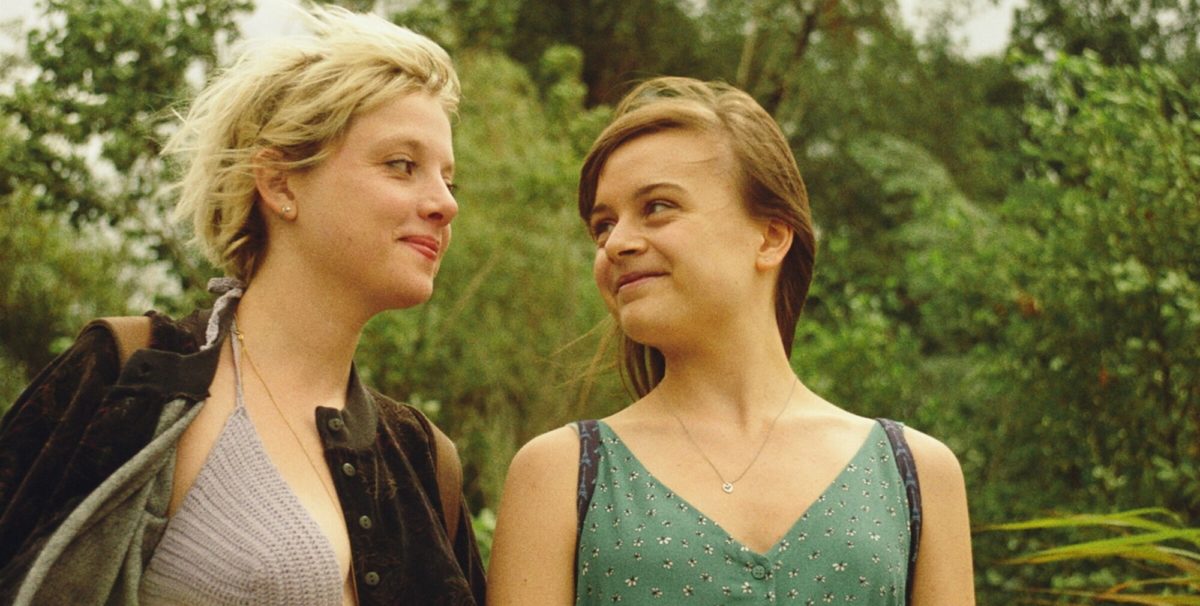This is the second piece in The Daily’s Frameline44 coverage. This piece covers select coming-of-age films from the festival. Due to film embargoes, some of The Daily’s coverage will be released upon their respective digital or cinematic releases.
In these three LGBTQ films, all of which could be considered coming-of-age films beyond featuring teens or young adults, something is learned and hard, existential truths about the world are taught. This, of course, is often a hallmark of coming-of-age films. But “Alice Júnior,” “No Hard Feelings” and “Cocoon” all take the coming-of-age narrative and run with it in different directions, situated terrifically within their national and cultural contexts.
“No Hard Feelings” (2020, Faraz Shariat, German title: “Futur Drei”)
“No Hard Feelings” is a unique film and is perhaps my favorite of the entirety of Frameline44. Its beauty is hard-won and pays off in its imagery and creative non-linearity as you go further into the film. “No Hard Feelings” won the prestigious Teddy Award at Berlinale 2020, joining the ranks of Lisa Chodolenko’s “The Kids Are Alright,” Lukas Moodysson’s “Show Me Love,” Cheryl Dunye’s “The Watermelon Woman,” Rose Troche’s “Go Fish” and Todd Haynes’ “Poison.”
Depicted in part through its marketing, the film’s thematic center is best represented through its German title, “Futur Drei” (literally “Future Three”). That is, the three central characters who vow to remain together in the future even if they’re separated. But for them, this vision of the future is difficult. “No Hard Feelings” follows Parvis (Benjamin Radjaipour), an Iranian-German young adult who must do community service hours at a refugee center. This is where he meets the Iranian siblings Amon (Eidin Jalali) and Banafshe (Banafshe Hourmazdi) who are seeking asylum in Germany. Forces beyond their control threaten to tear their carefully constructed world apart when one of the siblings is threatened with a deportation order.
For Parvis, Amon and Banafshe, they are one another’s worlds. They take shelter in each other, Parvis provides an outlet for the siblings who were forced to leave their entire lives behind and the siblings provide an outlet for Parvis, as he otherwise hides his queerness from outsiders. Amon and Banafshe have an incredibly close bond, but when Parvis and Amon hit it off, a whole new world is unlocked for the three of them — along with the struggles that come with being queer in a land that doesn’t accept them both as ethnic minorities and as queer individuals.
The magnificence of “No Hard Feelings” comes in its creative distortion of reality. When the inevitable starts to click into place, the film takes this “future three” beyond the scope of reality, portraying a mind-bending selection of snapshots of perhaps what could have happened. “No Hard Feelings” reimagines the relationships and lives of the three friends if the siblings could have both stayed in Germany, even if we know what “really” happens in real life. Because when they promise to stay together, they mean it. Just because they’re not with each other doesn’t mean they don’t exist as three forever, together.
“No Hard Feelings” has been picked up for a US release through M-Appeal.
“Alice Júnior” (2019, Gil Baroni)

The film centers on the titular Alice Júnior (Anne Celestino), a trans Brazilian high school student who becomes a semi-famous Youtuber after competing on a modeling reality TV show. Alice takes the “júnior” as a nod to her father, Jean Genet (Emmanuel Rosset), with whom she shared a name before she transitioned. Her father’s name, cleverly, is most likely a riff off of Jean Genet, a French novelist whose works contained extraordinarily homoerotic themes and material. Her father studies scents and creates extremely rare perfumes from natural ingredients, only adding to the delightful absurdity of why they must uproot themselves and move to a small, conservative and fictional town in the south of Brazil. They must go where the Araucaria angustifolia, or Brazilian pine — a critically endangered species — exists.
As Alice learns to navigate the rather hostile school environment, makes friends and crushes on a boy, all she longs for is to have her first kiss. As such, some have described “Alice Júnior” as a trans “Booksmart.” And stylistically it is in many ways, adding an Instagram-sticker-esque flair with animations and sound effects that pop up throughout the film. But, it also features an even more wildly diverse cast of characters, even giving Alice’s single father a romantic arc featuring a quirky plant-loving woman.
The film’s one major drawback is that it spreads its short runtime over many characters and miniature arcs, never able to devote enough time to all of them. But all in all, “Alice Júnior” is a fun, fulfilling watch with a fantastic pop and hip-hop soundtrack featuring trans and gender non-conforming Brazilian musical artists. It’s a refreshing take on the coming-of-age comedies that populate American cinema today, and great news — you can watch “Alice Júnior” on Netflix now. You might even see Alice get that first kiss she’s always dreamed of — but not in the ways that she or you might expect.
“Cocoon” (2020, Leonie Krippendorff, German title: “Kokon”)

Germany is hitting it out of the park this year with queer coming-of-age films, next with “Cocoon,” another film from Berlinale 2020. Reminiscent of the slow, water-filled cinematography of Céline Sciamma’s 2006 queer film “Water Lilies,” “Cocoon” dwells in the color grandeur of Berlin and is just as much a portrait of life in Berlin as it is of its protagonist, 14-year-old Nora (Lena Urzendowsky).
Taking place during a hot summer in the Kottbusser Tor area of the Kreuzberg district of Berlin, “Cocoon” follows Nora and her older, more popular sister Jule (Lena Klenke) as Nora is taken along with her sister to pool parties with Jule’s popular clique. While Jule and her friends openly flirt with boys, Nora’s drawn to Romy (Jella Haase), a tomboyish girl who easily hits it off as friends with the boys, much to Jule’s dismay. As Nora and Romy strike up something of a romantic friendship, they run the gamut of activities together — breaking into the pool at night and swimming, hanging out in Berlin together and even going to Pride together. The film slowly changes the tight aspect ratio to a wide one over the course of one pivotal scene — a freedom you might not even realize you were missing until you have it, just like Nora learns over the course of the film.
It’s Nora’s open, honest innocence about her sexuality that makes “Cocoon” so different. Nora blatantly says she’s attracted to girls like others around her are attracted to boys, and when one teacher laughs at her and tells her otherwise, Nora simply ignores the teacher and continues exploring and embracing her sexuality. It’s also a queer coming-of-age story that isn’t just about queer discovery — it’s also about sisterhood, living in Berlin, alcoholic single parents and straining against conformity beyond one’s sexuality. The true magic of “Cocoon” is in its cinematography more than its story, but its narrative is one of joy and youthful excitement in truly experiencing love and learning from it, even if it is fleeting.
Contact Olivia Popp at oliviapopp ‘at’ stanford.edu.
